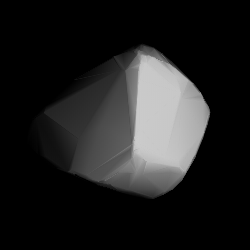347 Pariana
Appearance
(Redirected from (347) Pariana)
 Modelled shape of Pariana from its lightcurve | |
| Discovery | |
|---|---|
| Discovered by | Auguste Charlois |
| Discovery date | 28 November 1892 |
| Designations | |
| (347) Pariana | |
| Pronunciation | classically: /pæriˈeɪnə/[1] |
Named after | unknown [2] |
| 1892 Q · A892 WD | |
| Main belt | |
| Orbital characteristics[3] | |
| Epoch 31 July 2016 (JD 2457600.5) | |
| Uncertainty parameter 0 | |
| Observation arc | 123.38 yr (45065 d) |
| Aphelion | 3.04828 AU (456.016 Gm) |
| Perihelion | 2.17513 AU (325.395 Gm) |
| 2.61171 AU (390.706 Gm) | |
| Eccentricity | 0.16716 |
| 4.22 yr (1541.6 d) | |
| 8.01559° | |
| 0° 14m 0.661s / day | |
| Inclination | 11.6792° |
| 85.5359° | |
| 86.2897° | |
| Physical characteristics | |
| 48.615±0.118 km[3] | |
| 4.0529 h (0.16887 d)[4] | |
| 0.1845±0.036 | |
| M | |
| 8.96 | |
347 Pariana (prov. designation: A892 WD or 1892 Q) is a metallic background asteroid from the central region of the asteroid belt.[5] It was discovered by French astronomer Auguste Charlois at the Nice Observatory on 28 November 1892. The M-type asteroid has a short rotation period of 4.1 hours and measures approximately 49 kilometers (30 miles) in diameter.[3] The origin of the asteroid's name remains unknown.[2]
References
[edit]- ^ 'Pariani' in Noah Webster (1884) A Practical Dictionary of the English Language
- ^ a b Schmadel, Lutz D (11 November 2013). Dictionary of Minor Planet Names. Vol. 1 (3 ed.). Springer Science+Business Media. p. 66. ISBN 978-3-662-06615-7. OCLC 809148995.
- ^ a b c "JPL Small-Body Database Browser: 347 Pariana". Retrieved 11 May 2016.
- ^ Andersen, Geoff (2007). The Telescope: Its History, Technology, and Future. Princeton University Press. p. 77. ISBN 978-0-691-12979-2. LCCN 2006940308. Retrieved 10 June 2016.
- ^ Q. Ashton Acton, ed. (2012). "Bloomsburg University of Pennsylvania: A radar survey of M- and X-class asteroids II". Issues in Astronomy and Astrophysics: 2011 Edition. ScholarlyEditions. p. 2301. ISBN 978-1-4649-6368-1.
External links
[edit]- 347 Pariana at AstDyS-2, Asteroids—Dynamic Site
- 347 Pariana at the JPL Small-Body Database
